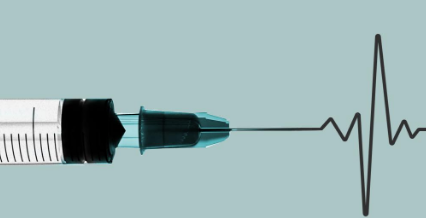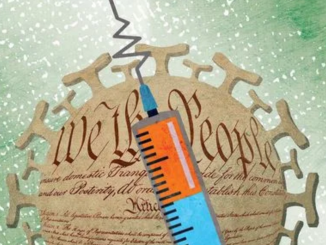
Under pressure from the military and his mother, Jacob Cohen was feeling increasingly cornered.
Mr. Cohen did not want to receive a COVID-19 vaccine. He knew the shots had not been available for long. He was worried about their safety.
While Mr. Cohen initially resisted receiving a shot, he faced restrictions such as being forced to remain on base while vaccinated soldiers left. He was also pressured by military commanders, who scheduled a vaccination appointment for him and contacted his mother as part of a multipronged campaign.
{snip}
“I didn’t want to take the vaccine. I didn’t believe in it,” he said. But he wanted to appease his mother. “I would do anything for her,” he said.
Mr. Cohen received his first shot, manufactured by Pfizer, on Sept. 22, 2021. He was 21.
Two weeks later, he was awakened by a sharp pain at 3 a.m.
“I felt like my heart was trying to get out of my chest,” Mr. Cohen said.
The soldier has felt pain before. “I never felt something like this,” he said.
Mr. Cohen went with a friend to the hospital, where he was placed in quarantine because he wasn’t fully vaccinated. Thirty minutes ticked by.
“I felt like it was the first time in my life I actually started seeing flashbacks of things that I did in my life—I felt like I was truly dying,” Mr. Cohen said.
Doctors finally came in and ran tests. They diagnosed Mr. Cohen with perimyocarditis, or inflammation of the heart muscle and the tissue around the heart.
They said Mr. Cohen was lucky. If he had come just a little later, he would have needed open heart surgery.
{snip}
Six months after leaving the hospital, Mr. Cohen’s cardiac MRI showed concerning results. His heart still hadn’t recovered.
Doctors gave him more pills.
“They told me maybe I will need them for the rest of my life,” Mr. Cohen said.
The military marked him as unable to serve for the rest of his life, and released him.
To this day, he suffers.
“I’ve been feeling, I’m not sure if it’s trauma or something, but it feels sometimes like a sting there, a short sharp pain,” Mr. Cohen said.
He’s also unable to do all he used to do before.
The orthopedic surgeon was motivated by a desire to prevent his patients from becoming sick.
“I didn’t want to put any of my patients at risk,” Dr. Hirschfeld told The Epoch Times.
He received a Moderna primary series, composed of two doses, in January 2021. He was 36.
{snip}
Dr. Hirschfeld has since undergone about a dozen electrocardiograms, another half a dozen echocardiograms, and a follow-up cardiac MRI.
“I went from being completely healthy—no issues, no medications—to seeing 10 different doctors in the blink of an eye,” Dr. Hirschfeld said.
The follow-up MRI, conducted about 18 months after the vaccinations, showed normal cardiac function.
But Dr. Hirschfeld still experiences pain.
“I have continued chest pain on the right side, and then I have neuropathic type pains in my neck and shoulder areas,” he told The Epoch Times. “I have it when I wake up, and it’s there when I go to sleep.”
The suffering affects the doctor physically and mentally.
“Having chest pain every day for two and a half years is very disconcerting,” he said.
{snip}
Even after the association was made public, officials and many experts claimed that the myocarditis cases were mild. Most patients were hospitalized, authorities acknowledged, but they said patients could expect to recover without treatment and with rest.
The myocarditis is “rare but mild,” Dr. Rochelle Walensky, the CDC’s director at the time, said on “Good Morning America” on June 24, 2021.
Dr. Walensky said the cases were “self-limited,” or didn’t require treatment to resolve.
Dr. Jeremy Faust, editor-in-chief of MedPage Today and a teacher at Harvard Medical School, on Twitter two days later described the cases as “self-limited troponinemia,” or elevated troponin levels that would resolve on their own. Troponin is a protein in the heart that’s a marker of heart injury.
Those claims were already wrong at the time, based on case reports alone.
Like many early case reports, no follow-up data were reported, making it impossible to say that the cases had fully resolved.
{snip}
“That’s something that’s permanent. And so to tell me that my cardiac muscle breaking down is mild is pretty insulting.”
Mr. Warner, who lives in the western United States, teaches older people and wanted to protect them from COVID-19. The CDC and others promoted the idea that the vaccines curbed or even prevented transmission based on observational data.
“The sentiment was these are safe and effective. If you get them, you don’t need to wear a mask anymore, and you can’t transmit COVID or catch COVID,” Mr. Warner told The Epoch Times. “I spend quite a bit of time around older people and help them learn.
“I wasn’t necessarily afraid of COVID myself. Not that I did respect it, but I wasn’t worried it was going to kill me,” he added. “But I was worried about getting someone else sick, especially when I’m with our older clients.”
Mr. Warner was diagnosed with myopericarditis after COVID-19 vaccination and was hospitalized.
After being discharged, Mr. Warner was bedridden for weeks.
“There’s points where I was unable to even get up out of bed without passing out or blacking out,” Mr. Warner told The Epoch Times. “It was really eye-opening. I felt like I went from being 28 years old to being 88 years old.”
{snip}
Mr. Warner utilizes a heart rate monitor, which he became familiar with in his racing career.
During a recent ride, Mr. Warner pushed himself, trying his hardest for four minutes. That sent his heart rate up to 189 beats per minute—the highest since the injury.
“I did OK, but then the next few weeks, I had a kind of a lingering chest pain and tightness. And about four days after, it was pretty significant where I was having a hard time sleeping and my heart felt like it was palpitating every once in a while, and then—even more than a week later—I still had a little bit of chest tightness and pain,” Mr. Warner said.
“It kind of scared me because it’s been well over a year since my last treatment with hyperbaric and I’m still dealing with it. And when I do try to push myself harder, then I have to pay for the next few days to a week.
“Back in the day, I would be able to do that with no problem at all.”
Doctors who have spoken to Mr. Warner have told him that when his heart becomes stressed, it signals his immune system to attack and inflame it.
He tries to keep his heart rate under 160 beats per minute.
It was June 12, 2021, two days after Aiden received a second shot of Pfizer’s vaccine. He was 14.
{snip}
Tests revealed abnormalities. Aiden was taken to the acute cardiac unit, where more tests confirmed that the vaccine was the cause.
Aiden spent four days in the hospital. After being discharged, he was inactive for more than four months.
“I don’t know where they get this ‘two days and you’re done, you’re good.’ That’s a crock of [expletive],” Emily Ekanayake, Aiden’s mother, told The Epoch Times.
Ms. Ekanayake had read early studies from Israel that found an elevated risk for myocarditis among young males who had received the Pfizer vaccine, but concluded with her son that the benefits of the vaccine outweighed the risks.
“I was really scared of COVID,” Ms. Ekanayake said.
Aiden said he wanted to get vaccinated to help protect himself and his brother, both of whom have asthma.
{snip}
Aiden eventually resumed exercise after being cleared by a cardiopulmonary stress test.
The result of the test was “probably more like that of an old man,” Ms. Ekanayake said. “His CO2 was low. He wasn’t able to run much. He’s got a lot of work in that way to go still. But he does like walking.
But in addition to the round trip to get to the pool, the Israeli boy needed to stand in line to take a test for COVID-19.
School also was an issue. Fellow students would often get sick, triggering a quarantine of those who weren’t vaccinated.
“There was no chance to arrive to school and not be informed the next day that someone is sick and you [need to] be in quarantine,” Alon’s mother, who spoke on condition of anonymity due to fear of professional repercussions, told The Epoch Times. “It’s impossible. It’s like putting a child in prison for doing no wrong.”
Alon’s mother saw vaccinated people become sick despite the vaccine, erasing her belief that the shot protected people. But she heard little about possible side effects and decided that the benefits, including keeping her son in school, meant he should receive the shot.
“He was tired of the quarantines and tests,” she said.
The first shot was injected on Dec. 3, 2021; the second shot was on Dec. 24, 2021. Alon was 9.
A few days later, Alon fell into a deep sleep.
“It was scary,” Alon’s mother said.
Doctors ran tests, including checking his heart. They couldn’t discern what was awry.
“The child is not functioning,” Alon’s mother said. “He was like half a human for the whole month.”
The breakthrough came when Alon said, “My heart hurts.” Fresh testing revealed myocarditis. It was induced by the vaccination, doctors concluded.
{snip}
Follow-up visits found no heart problems. The other symptoms eventually resolved and Alon was cleared to resume sports. He plays for hours each day. But nearly two years later, he still suffers.
“He has periods when his heart hurts,” Alon’s mother said. “Sometimes for a few months, everything is fine. And then suddenly, it comes back.”
She has opted to take her son to the doctor only when emergencies arise. Any time he sees a doctor, he becomes sick. And he refuses to take any more blood tests.
Because he didn’t want to become infected by the new Omicron variant, Mr. Cutler received a Moderna booster shot on Dec. 14, 2021. He was 26.
The next day, Mr. Cutler began to experience symptoms such as fatigue. He went to sleep early, but at 2:30 a.m., he was startled awake.
“I woke up and have never felt so terrible in my life,” Mr. Cutler wrote in a summary of his experience.
After several days of trying to sleep the pain away, a family member convinced the Massachusetts resident to go to the hospital.
Doctors ran tests and found troponin-T levels almost 90 times the normal maximum levels.
{snip}
A 10-minute walk to the grocery store, Mr. Cutler said, would have been the only exercise he could manage in a day. He described having to “budget” his energy.
After about two months, his condition started to improve. The pain dropped to 3s on some days. Then 2s. Then zeros.
By the end of April 2022, Mr. Cutler was able to begin lifting weights again. A follow-up cardiac MRI revealed a small fibrosis, or scar, but he feels he has recovered.
More recent data have shown that some patients still haven’t recovered.
Other papers have found that even when symptoms abate, follow-up testing reveals abnormalities.
Researchers often use abnormal levels of late gadolinium enhancement as an indication of heart scarring.
“It’s going to be a small percentage of the people that recovered from myocarditis, but some of them could be in for longer-term problems and morbidity, and some of them may develop actual disability,” Dr. Andrew Bostom, a U.S. heart expert, told The Epoch Times.
{snip}
Dr. Rabea Asleh, director of the heart failure unit and the cardiovascular research center at the Hadassah University Medical Center in Jerusalem, said his team is also following patients to make sure they’re OK.
He told The Epoch Times that all but one of his patients have stopped experiencing symptoms.
“If this has any clinical significance regarding the flare-up of the disease later on or the deterioration in function after a few years, we do not know,” Dr. Asleh said, “but deterioration in function after a few years is unlikely.”
Israeli military authorities punished the unvaccinated with actions ranging from taking away their leave to making them wear a special vest and isolate in their quarters.
“This is a population of young and healthy soldiers, in whom COVID is mild and transient, and there is no justified reason to vaccinate them,” Dr. Yoav Yehezkelli, a specialist in internal medicine and medical management, said on Facebook. “Vaccinating the soldiers was not only folly but a lack of professionalism and a violation of medical ethics.”
“They premised their policy recommendations—the vaccine passports, the mandates, the coercion, and also the gaslighting of people who are actually vaccine-injured, on this idea that we have to get a sufficient fraction of the population vaccinated for the disease to go away.”
The White House has defended the mandates.
Patients often suffer symptoms within a week of vaccination, according to case reports, surveillance databases, and patients.
Early detection and treatment can be critical to prevent further deterioration. Exercise restrictions are imposed on most patients until they pass a cardiac stress test.
The point of the test is to detect lingering problems in a controlled setting, in which the patient exercises at less than maximum capacity, Dr. Anish Koka, a U.S. cardiologist, told The Epoch Times. Problems detected on the test may preclude participation in competitive sports and may require invasive therapies such as defibrillator placement.
Some health officials and doctors have said the myocarditis resolves without treatment, but many patients have received drugs.
Colchicine, typically used to treat gout, has been favored by many doctors.
Mr. Cohen was initially prescribed colchicine. He was directed later to daily take Tritace, an angiotensin-converting enzyme inhibitor that’s meant to treat hypertension following serious problems such as heart failure.
Mr. Cutler took aspirin for two weeks. He replaced colchicine with ibuprofen after experiencing back pain.
Other treatments include intravenous immunoglobulin, a pooled antibody; beta-blockers; anti-inflammatory medications such as methylprednisolone; and rampiril, another angiotensin-converting enzyme inhibitor.
“You start to realize that basically the authorities, first of all, they knew about these possible side effects. They just chose not to disclose it, or disclose it only in the few websites in the small letters,” Mr. Cohen said.
Patients also feel abandoned.
“A lot of us are still dealing with significant issues that I think are being ignored,” Dr. Hirschfeld said.
It hasn’t helped that U.S. authorities, who have aggressively promoted the vaccines, have refused to provide compensation to many sufferers or otherwise assist them.
{snip}
The myocarditis patients largely spoke about receiving the support of family and friends as they recovered. But not all.
“I was disowned by many of my friends for speaking out about this early on,” Mr. Warner said. “It’s been interesting to see so many of them come back around and apologize to me.”
* ORIGINAL ARTICLE:
https://bonginoreport.com/health-fitness/they-suffered-myocarditis-after-covid-19-vaccination-years-later-some-still-havent-recovered


